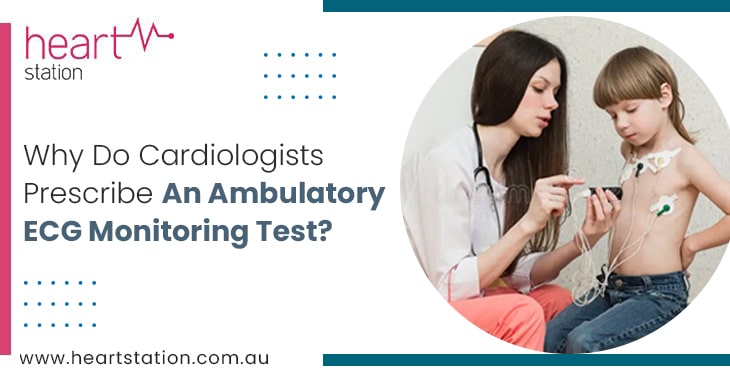An Ambulatory ECG Monitoring, or a Holter monitor, is a common test ordered by cardiologists to gain more insight into a patient’s heart rhythm. During this non-invasive test, patients wear a portable device to monitor their ECG continuously for 24-48 hours. Cardiologists prescribe this test for several reasons. In this blog, Heart Station, a renowned cardiac diagnostic centre in Pimlico, Australia, will discuss these reasons.
At Heart Station, our expert technicians can conduct accurate and safe Ambulatory ECG Monitoring Test to help you detect heart diseases. If you want the Best Ambulatory ECG Monitoring Centre, visit our clinic and let our professional conduct this test. Here, you can get free cardiac tests if you have a referral from any physician in Townsville, Pimlico and have Medicare.
Now let’s have a look at the detailed discussion:-
- Catching Intermittent Arrhythmias
- Evaluating Arrhythmia Triggers
- Assessing Anti-Arrhythmic Medications
- Diagnosing Transient Loss of Consciousness
- Monitoring At-Risk Patients
- Assessing The Risk of Stroke
- Monitoring During Exercise or Activities
- Evaluating Pacemaker or Implantable Cardioverter
Catching Intermittent Arrhythmias:
Some arrhythmias like atrial fibrillation only occur sporadically. A standard 10-second ECG may not catch these occasional irregular beats or rhythms. However, with ambulatory ECG’s continuous extended monitoring, brief arrhythmia episodes are more likely to be recorded. The detailed report enables cardiologists to diagnose intermittent issues not apparent on routine ECGs.
Evaluating Arrhythmia Triggers:
Ambulatory ECG Monitoring creates a valuable log of your heart rhythm during daily life. Cardiologists can analyze this data to identify potential triggers for arrhythmia episodes. Does heart rate become erratic during certain activities? Do palpitations occur more frequently under stress? This insight guides individualized treatment plans to avoid identified triggers.
Assessing Anti-Arrhythmic Medications:
For patients already diagnosed with arrhythmia, ambulatory ECG monitoring provides an effective way for cardiologists to assess responses to anti-arrhythmic medications prescribed to control abnormal heartbeats. If arrhythmias are well-regulated on the current drug regimen, your doctor may maintain the course. Signs of breakthrough arrhythmias may prompt adjusting medication type or dosage.
Diagnosing Transient Loss of Consciousness:
Fainting or dizziness spells often stem from heart rhythm disturbances that momentarily reduce blood flow to the brain. Underlying arrhythmias like ventricular tachycardia may only arise occasionally. A Holter monitor worn during typical activities can record ECG data during a real-world spell. It assists cardiologists in determining the cause and guiding appropriate treatment.
Monitoring At-Risk Patients:
For patients at increased risk for arrhythmias, such as those recovering from a heart attack or heart surgery, the Ambulatory ECG Monitoring Test provides helpful screening even without overt symptoms. Early detection of arrhythmia onset allows rapid intervention to avoid complications in these higher-risk individuals.
Assessing The Risk of Stroke:
Atrial fibrillation is one arrhythmia that dramatically raises the risk of stroke. Ambulatory ECG monitoring aids in detecting cardiac arrhythmias and allows cardiology doctors to start the necessary procedures or recommend blood-thinning drugs to lower the risk of stroke.
Monitoring During Exercise or Activities:
Sometimes, symptoms or irregularities may only occur during specific activities or exercise. Ambulatory ECG Monitoring can be tailored to record the heart’s electrical activity during these specific times, providing a more comprehensive evaluation of cardiac function.
Evaluating Pacemaker or Implantable Cardioverter:
Ambulatory monitoring is crucial for people who have implanted devices like pacemakers or implantable cardioverter-defibrillators (ICDs) to evaluate how well the device works and ensure it successfully controls the heart’s rhythm.
Sum Up
Ambulatory ECG Monitoring Test is a powerful diagnostic tool for evaluating cardiac health. For individuals with cardiac concerns, undergoing an Ambulatory ECG Monitoring test, as a cardiologist prescribes, is vital to maintaining optimal cardiac health and overall well-being. If you want the best ambulatory ECG monitoring in Pimlico, Australia, visit Heart Station today.

